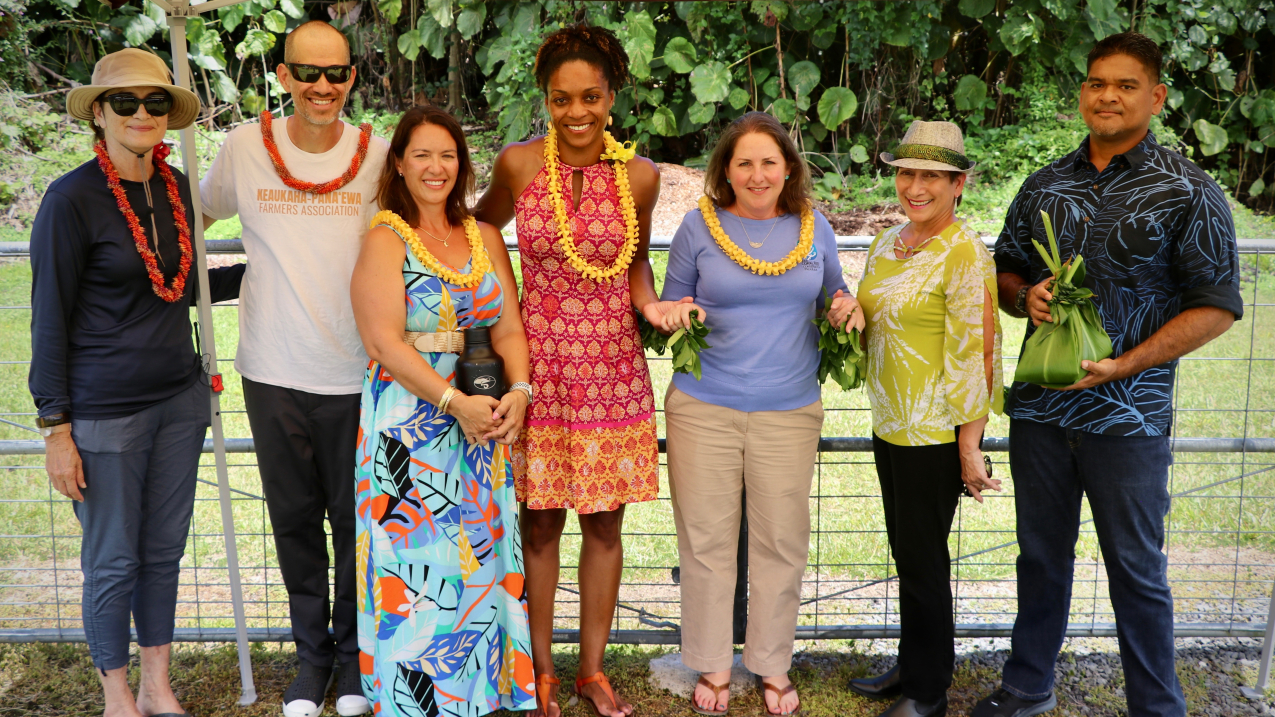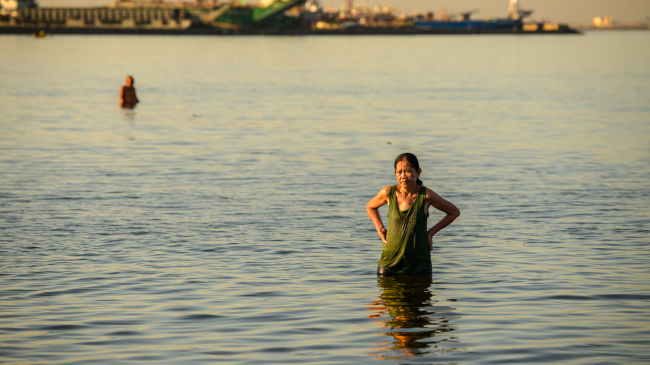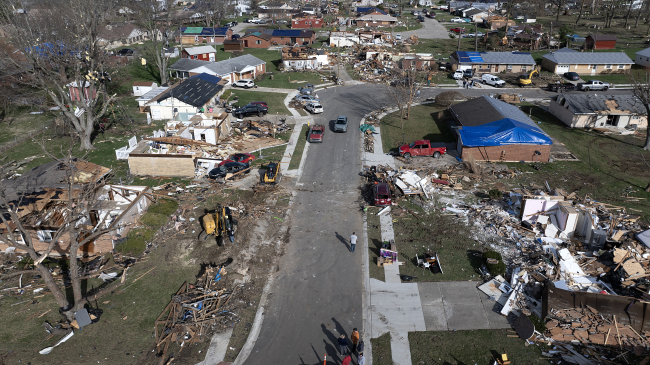Project will focus on the co-production of knowledge by NOAA, Hawaiian Homestead Community and partners

Representatives from NOAA and Keaukaha Panaʻewa Farmers Association affirm partnership through site blessing of the pilot project. Pictured from left to right are: Nāmaka Rawlins (Panaʻewa homesteader), Makaʻala Rawlins (Keaukaha Panaʻewa Farmers Association member), Pua Kamaka (NOAA Pacific Islands Coordinator), Letise LaFeir (NOAA Senior Advisor), Nicole LeBoeuf (Assistant Administrator for NOAA’s National Ocean Service), Maile Luʻuwai (President of Keaukaha Panaʻewa Farmers Association) and Kalani Quiocho (NOAA’s Office of National Marine Sanctuaries Pacific Islands Cultural Resource Coordinator). (Image credit: Keʻala Lucero, Co-Creative Studios)
NOAA and Hawaiʻi-based partners are launching a new pilot project to co-produce a poly-forestry climate dashboard with the Keaukaha Panaʻewa Farmers Association for the community of Panaʻewa on the Island of Hawaiʻi. Poly-forestry (“poly” to mean both “many” as well as “Polynesian”) is a traditional Pacific Island system for managing land use that aims to increase the overall yield of the land by combining the productions of crops (including tree crops) and forest plants and/or animals on a given unit of land. The pilot will apply management practices that are culturally compatible with the local population.
“Ensuring that NOAA’s climate data and tools are useful for everyone, and building community resilience to climate change reflect the core fundamentals of equity at the Department of Commerce,” said Deputy Secretary of Commerce Don Graves. “I’m excited that Keaʻahuli brings together so many partners that are dedicated to learning from each other and working together to put data to work in a way that benefits the community.”
The pilot project, “Keaʻahuli O Panaʻewa - Poly-Forestry and Climate Dashboard” aims to establish a food forest — a species-rich, multilayered poly-forestry system that contains useful food and medicinal plants and extends up, down and out. The project will build farmer knowledge about the effects of changing weather and climate patterns such as the El Niño-Southern Oscillation, and foster community engagement and agro-resiliency in the Panaʻewa Hawaiian Homestead. Through a $150,000 NOAA investment in Fiscal Year 2022 towards the administration and completion of the pilot project, Keaukaha Panaʻewa Farmers Association will partner with NOAA, the National Marine Sanctuary Foundation, East-West Center, and University of Hawaiʻi at Mānoa to blend traditional knowledge associated with poly-forestry and planting with western science, and utilize NOAA data and climate expertise in order to create a data set for the homestead community.
Project objectives include:
- Co-producing an agricultural and climate dashboard for the Panaʻewa area based on the climate predictions for the year.
- Designing and creating a poly-forestry system that is resilient and responsive to the climate and environmental conditions in Panaʻewa.
- Fostering community resilience and food security through agricultural training, education and volunteer opportunities.
The pilot project was developed in response to feedback received during a 2021 climate and equity talk story about “Equitable Resilience in Light of a Climate Emergency.” The talk story was an opportunity for NOAA leadership to hear from communities, organizations, and agencies in Hawaiʻi and determine how to better serve them by enhancing understanding of climate change impacts and adaptation, increasing capacity to take actions that will enhance resilience, and doing so in a manner that is pono (right) for all.
“The climate and equity talk story in 2021 helped open a dialogue about how NOAA can best serve communities in Hawaiʻi by providing climate data and tools that can help them be more resilient in light of climate change. I’m excited and honored to continue listening, learning and building useful tools as we move forward with this project,” said NOAA Administrator Rick Spinrad, Ph.D. “Making NOAA’s vast array of climate data accessible, understandable, and relevant will help the Panaʻewa Hawaiian Homestead community plan, prepare, and build food security for changing conditions, and build a prosperous future.”
“Mahalo to NOAA for selecting us as a project partner. Keaʻahuli is an exciting opportunity for our Hawaiian community to engage in science driven akamai agriculture to grow resilient abundant food,” said Maile Luʻuwai, Keaukaha Panaʻewa Farmers Association President. “Keaʻahuli will use climate change as a positive force for food security in Hawaiʻi.”
This pilot project builds on NOAA’s commitment to sustained engagement with underserved communities, and is part of an investment in seven pilot projects in the coming years. Each regional pilot will respond directly to feedback received from partners during climate and equity roundtable discussions that were conducted in 2021. Pilots will take a unique, place-based approach to helping vulnerable communities better understand, prepare for and respond to climate change.
Learn more about upcoming pilot project announcements and NOAA’s ongoing environmental justice efforts.
Media contacts
NOAA: Lori Arguelles, lori.arguelles@noaa.gov
East-West Center: Derek Ferrar, FerrarD@EastWestCenter.org
Keaukaha Panaʻewa Farmers Association: Malie Luʻuwai, maile@luuwailaw.com
The National Marine Sanctuary Foundation: Chip Weiskotten, chip@marinesanctuary.org
University of Hawaiʻi at Mānoa, School of Ocean and Earth Science and Technology: Marcie Garabowski, mworkman@hawaii.edu



